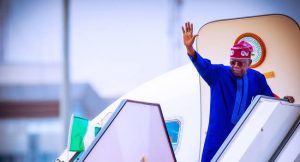
President Bola Tinubu is set to attend the 2025 edition of Abu Dhabi Sustainability Week in the United Arab Emirates. Disclosing this in a statement on Friday, presidential spokesman, Bayo Onanuga, said the summit will take place from January 12 to 18.
Tinubu’s planned trip to the Middle East is at the behest of the President of the United Arab Emirates, Highness Sheikh Mohamed bin Zayed Al Nahyan. “The Summit will bring together global leaders to accelerate sustainable development and advance socioeconomic progress,” the statement read. “The event, ‘The Nexus of Next; Supercharging Sustainable Progress,’ will enable policymakers, business, and civil society leaders to explore pathways to fast-track the transformation to a sustainable economy and evolve a new era of prosperity for all.
“ADSW, a testament to the power of collaboration, has been held annually for over 15 years. It provides a global platform to foster multi-stakeholder cooperation in addressing global challenges and accelerating growth.” He said the summit would also pave way for high-value agreements and strategic partnerships between governments, industry leaders, and clean energy pioneers worldwide, driving impactful alliances and advancing the sustainability agenda worldwide.
“At the event, President Tinubu will stress his administration’s reforms, including those related to energy sufficiency, transportation, public health, and economic development,” Onanuga stated. Tinubu and his entourage would also meet with the Emirate’s leadership to discuss issues of interest affecting the two nations. The Minister of Foreign Affairs, Ambassador Yusuf Tuggar, and other senior government officials will accompany the President.
The President is expected back in the country on Thursday, JBillions Spent, Darkness Prevails: Nigeria’s Power Sector in Crisis
Despite securing over $3.23 billion in international loans from institutions like the World Bank and the African Development Bank between 2020 and 2024, Nigeria’s electricity generation remains stagnant at an average of 4,500 megawatts for its 200 million citizens. This persistent shortfall has led to widespread blackouts, crippling industries and daily life.
In September 2024, the World Bank approved a $500 million loan for the Sustainable Power and Irrigation Project, aiming to enhance energy reliability and agricultural productivity. Additionally, in December 2023, the bank sanctioned $750 million for the Nigeria Distributed Access through Renewable Energy Scale-up Project to expand renewable energy access. Despite these substantial investments, the national grid’s output has barely improved, with peak generation reaching only 4,743 megawatts as of January 2025.
The African Development Bank also contributed with a $500 million loan in July 2024 to transform Nigeria’s electricity infrastructure and promote cleaner energy sources. However, the country continues to experience erratic power supply and frequent grid collapses, with over 100 incidents recorded in the past decade. In 2024 alone, there were 12 national grid breakdowns, exacerbating the energy crisis.
Implementation delays and legal challenges have further hampered progress. For instance, the $500 million Nigeria Distribution Sector Recovery Programme, approved in February 2021 to improve the performance of electricity distribution companies, faced significant setbacks due to court cases and slow legislative approvals. These obstacles have impeded the timely execution of critical projects aimed at enhancing power distribution.
The Nigerian government acknowledges the need for substantial investment to achieve a stable power supply. The Minister of Power, Adelabu Adebayo, stated that at least $10 billion is required over the next decade to ensure 24-hour electricity nationwide. Despite these acknowledgments, the gap between financial inflows and tangible improvements remains glaring, raising concerns about the effective utilization of funds and the future of Nigeria’s energy sector.
As Nigerians continue to endure unreliable electricity despite billions in loans, the pressing question remains: Will Nigeria break free from this cycle of power instability, or is the nation destined to remain in the dark?
#darkness #nigeria #NigeriaElectricity #nigeriapowercrisis #nigeriapowersector #nigeriapowergeneration #nigeriapowersupply #viralreels #fypシ゚viralシ #fypシ゚ #fypviralシ #fyp2025 #reelsvideoシ #fypシ゚viralシfypシ゚anuary 16.
